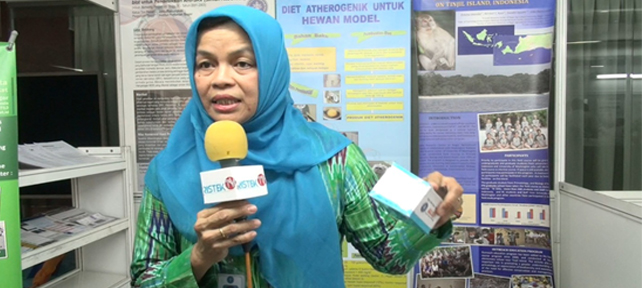
Javan Gibbons Successfully Breed By Primate Animal Study Center
In a series of 2014 Science and Technology Featured Center Award held on Tuesday, December 16, there was a Science and Technology Center (PUI) Featured Product Exhibition held in the lobby of Gedung II BPPT for 2 days, December 16-17 2014. No fewer than 27 institutions The Center for Science and Technology featured its superior products. Interestingly, from the 27 PUI exhibition stands, there was an exhibition stand from the Primate Animal Study Center (PSSP). It is interesting because of the vast majority of R & D that display processed products and research as the center of excellence, in this Primate Animal Study Center the products are primates that can be used as animal models.
The study center under the Bogor Agricultural Institute’s research and community service institute was formed in response to the need for an institution that can act as a center for developing science, technology and management related to primate animals, and can play a role at national and international levels . Because Indonesia is rich in primate species, more than 35 species of primate are mostly endemic to Indonesia. therefore, Primate Animals are a very potential center to always develop and are expected to benefit Indonesia, which is rich in biodiversity.
The potential of the Primate Study Center includes the fields of Biomedical, Biological, and Conservation. In his explanation, the Executive Secretary of the Primate Study Center, Irma Suparto said, “in the field of Biomedics, unprotected primates in Indonesia or what we often know as monkey masks and monkey monkeys that are often used to extract coconut are considered pests in Indonesia. Therefore, we deliver these animals and then use them to prove disease in humans, for example, we want to test a drug or vaccine ingredient, etc. ”
What distinguishes this R & D from other R & D at the PUI exhibition yesterday was one of the products of this primate animal that is a model animal used for human diseases. But to achieve being a model animal must go through various stages, including animals must be saplings and not wild, other than that it is free of certain viruses or so-called specific pathogen free.
“We made an ELISA (Enzyme Linked Immunosentent Assay) system, which is an analysis of viruses in monkeys. Then with Western Blot Assay to detect the presence of the virus, “added Irma Suparto. Other products from the Primate Animal Study Center include Enzym Reverse Transcriptase which is widely used in the field of Biotechnology, because this enzyme is needed to multiply DNA or RNA. At present, these enzymes are being developed and working with an industry. In addition to the biomedical field, PSSP also makes a peak cell system in collaboration with the University of Indonesia’s Faculty of Medicine, surgery, dental repair, and bone repair parts.
The next field of science is Conservation that has been carried out by the PSSP on endangered animals, including Tarsius, slow loris, proboscis monkey, and Javan gibbon. In his statement Irma Suparto said, “We have breached Javan gibbons which are monogamous, meaning that the animals must be paired first. We have a pair of Javan gibbons named Ari and Mimis, but now we have returned to the Safari Park because now we have 5 children and now it is getting bigger, so we need more space, finally being taken to the Safari Park. ”
Another field of science is Biology. To reproduce animals, you must learn the behavior, and reproduction first, because each animal has a slightly different reproductive nature. Therefore, the biological field is important to recognize genomics, namely the gene map system of these animals.
“We are very grateful to get the opportunity to be guided by PUI which focuses on biomedicine by prioritizing its processes through conservation and biology. Our focus later is to make animals 2 models for degenerative diseases. Because Indonesia is increasingly obese, so research on obesity, heart disease, atherosclerosis and diabetes are all interrelated, “said Irma.
Non-infectious diseases that are a problem in Indonesia are dengue fever, high mortality rates, but the vaccine does not yet exist. PSSP has a collaboration with the dengue consortium which is also from research and technology to produce dengue fever vaccines. Then the PSSP prepares animal models that are free from anti-dengue bodies or antigens.
“Therefore, maybe the product is different from other PUI friends, many products can be eaten, planted, or sold directly. “Our product is to facilitate other friends who want to research using animals that meet the requirements, meet the criteria, and want to maintain animal welfare,” he added.
The Primate Animal Study Center, which has been accredited by AAALAC International since 2006, also collaborates with NGOs, including the Orang Utan rehabilitation, Tanjung Putting, and Java Gibbon Center (JGC). Whereas foreign cooperation with the US includes Wake Forest University to study about Atherogenic diseases; with Washington University to study animal behavior, conservation, and also HIV; with Koppenhagen to study the Human Papilloma Virus; and with Thailand to study HIV. While domestic cooperation includes the Faculty of Medicine, University of Indonesia, Padjajaran University, and also in Makassar. (nisa-pkl / humasristek)
Source : Ristek




